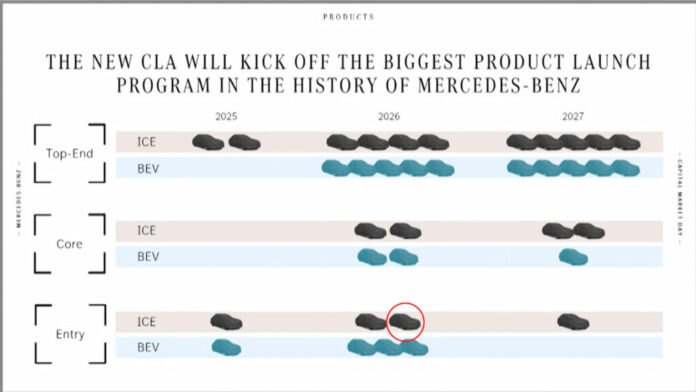Among the few compact luxury SUVs with three-row seating, the Mercedes GLB is a crucial model in the Mercedes-Benz line-up, especially in the U.S. and China. In 2026, around seven years after its world premiere, Mercedes-Benz will fully redesign its second smallest SUV, fitting it with a new hybrid system. Here’s what we expect from the second-gen Mercedes GLB:
Confirmation
While test prototypes of the next-gen GLB in Europe are an indirect confirmation of the successor plan, Ola Källenius, Chief Executive Officer of the Mercedes-Benz Group, hinted that the new GLB and GLA would follow in the MMA market architecture series, following the CLA.
You know, we sort our world when we think about how our portfolio is built up – Top-End, the AMGs, the Maybachs, the Gs, the S-Class, the GLS, that kind of family. Core, where we have the E-Class and the C-Class and the GLCs and the GLE. And entry, the new MMA market architecture, where the CLA is, where the GLA is, GLB, and so on.
Ola Källenius, CEO of the Mercedes-Benz Group, at the Capital Market Day in Sindelfingen on February 20, 2025
Design
Moving to its second generation, the Mercedes GLB is expected to soften up, adopting a more crossover-ish styling. The powerful proportions should stay as it is, but we expect quirkier front and rear fascias that give it a more youthful and trendy look.

As presented in our rendering, the next-gen Mercedes GLB should appear less squarish
due to several new design elements. At the front, a more strongly rounded outline of the hood, curvy headlamps integrating a star-shaped DRL and connected via a light band, and a visibly curvier upper grille and bumper could be key to the more lifestyle-oriented character.
On the sides, flush-fitted door handles should electrically glide out and retract to their streamlined closed position. At the back, the layout of the tail lamps, bumper, and tailgate will be different from the outgoing model, following the new connected strip design.
Interior

The next-gen Mercedes GLB will likely have a more refined interior with reduced clutter and greater digitalisation. The center focus of the cabin should be a sleeker dashboard featuring a large full-width glass surface called ‘MBUX Superscreen’. This ultra-wide glass panel will likely integrate a 10.25-inch digital instrument cluster on the driver’s side, a 14-inch infotainment touchscreen in the center, and a star pattern graphic on the passenger’s side.
Mercedes-Benz should give customers an option for a 14-inch passenger touchscreen in place of the star pattern graphic. And like in the current GLB, three-row seating for seven people will likely be optional. The two-row, five-seat version would be aimed at customers who need extra luggage space, for example, to support their outdoor gear or weekend excursion. Mercedes-Benz is expected to improve space efficiency for the next-gen model, particularly to increase comfort for third-row occupants.
Specifications

Based on the new MMA platform, the next-gen Mercedes GLB should be a mild-hybrid electric vehicle as standard. The new M 252 1.5-liter turbocharged four-cylinder gas engine and the new 8F-eDCT 8-speed dual-clutch automatic transmission should come standard. The latter should integrate a 20 kW (27 hp) electric motor that recovers up to 25 kW of energy and stores it in a 48-volt, 1.3 kWh battery pack for later use. A permanent all-wheel drive system will be available.
According to a report from JESMB, Mercedes-Benz will offer the next-gen GLB in 180, 200, 200 4MATIC, and 220 4MATIC variants. The gas engine will produce 134 hp and 148 lb.-ft. of torque in the 180 variant and 161 hp and 184 lb.-ft. of torque in the 200 and 200 4MATIC variants, respectively. In the 220 4MATIC variant, the power and torque will reach up to 187 hp and 221 lb.-ft., respectively.
Also See: Mercedes GLB Electric (EQB successor) rendered ahead of its 2026 debut
Release Date
The next-gen Mercedes GLB is expected to go on sale globally in Fall 2026. The U.S. should be among its first launch markets globally.



